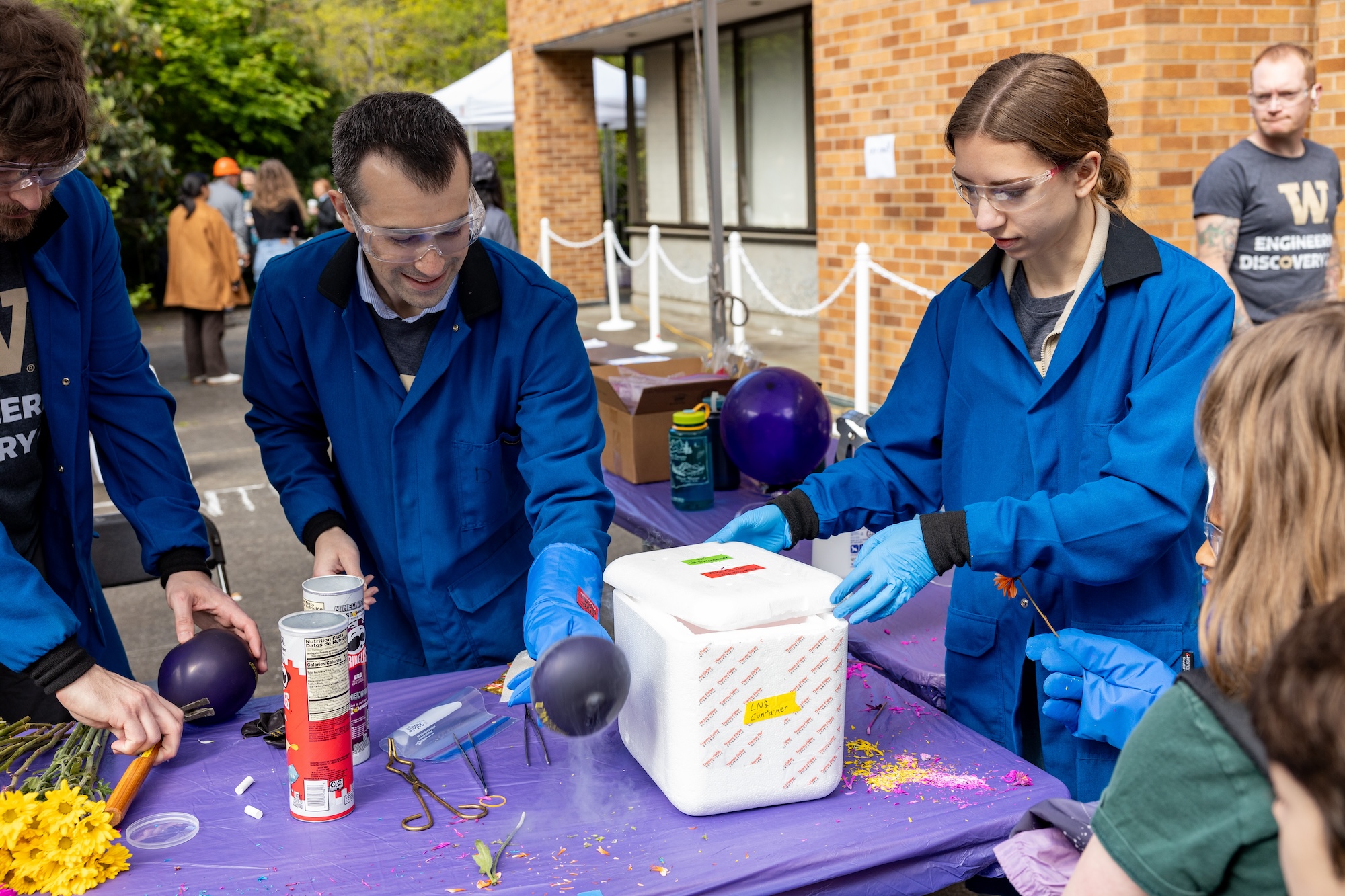By Ro Stastny
October 14, 2025

Joelle Scott loads a sample into a reactor that performs vapor phase synthesis, a method that is part of her research in improving wastewater treatment in the Bergsman lab.
UW Chemical Engineering graduate student Joelle Scott, from the Bergsman Research Group, is working toward a more sustainable and equitable future through advanced materials research, testing new methods to remove toxic forever chemicals and other contaminants from wastewater.
Before beginning her Ph.D. program at the University of Washington, Scott earned her bachelor’s degree at Case Western Reserve University in Cleveland, where she conducted research on membranes as an undergraduate student. It was at that time that she concluded that she wanted to continue doing membrane research in graduate school, with an environmental focus. Scott met UW ChemE assistant professor David Bergsman at a conference, and his research group’s innovative work in advanced materials seemed to align well with her goals. She was a Clean Energy Institute Graduate Fellow from 2023 to 2024.
Scott is now in her fourth year as a Ph.D. student in chemical engineering, working in the Bergsman Research Group on two projects focused on water treatment.
Removing ‘forever chemicals’ from water
Perfluoroalkyl and polyfluoroalkyl substances (PFAS), colloquially known as ‘forever chemicals,’ are synthetic substances used widely across many everyday items like cookware, storage containers, clothing and cosmetics. PFAS do not degrade easily or quickly and are now highly prevalent in water sources, presenting a significant public health challenge. Some existing methods of PFAS removal are effective at removing these harmful compounds, but can be timely, expensive and ineffective at removing smaller PFAS compounds. Membrane filtration can be a cheaper, quicker and more effective process.
Scott is testing a new vapor phase synthesis method to create polymeric membranes for removing PFAS from water. The vapor phase synthesis process of making these membranes is cleaner and more efficient than the common liquid phase method, eliminating the need to use toxic solvents to break down chemicals. Using vapors also opens up new avenues in chemistry to achieve a desired reaction, and ultimately results in more uniform polymeric membranes, improving the rejection and removal of PFAS as the water passes through.
Battery ion recycling
Battery power is on the rise as people adopt cleaner forms of energy and transportation globally. While this transition to clean energy is a good thing, it doesn’t come without its own environmental costs. Water used in the battery production process becomes contaminated with heavy metals, something that also occurs from the improper disposal of batteries. The ions of heavy metals are highly hazardous and harmful to the health of people and the planet. Removing battery ions from water has the potential to address both the water contamination problem and the need to recover these metal ions and use them again to produce new batteries.
Scott is recycling heavy metal ions from wastewater using hydrogels in a process called reaction-diffusion coupling. The metal ions will react with a counter ion contained in the gel, causing them to separate evenly. Scott is using this method and experimenting with different gel structures and counter ions to see how the separation of the battery ions from the water changes or improves.
Mentorship and engagement in ChemE

Joelle Scott (right) assists chemical engineering assistant professor David Bergsman in giving a demonstration for the Engineering Discovery Days activities hosted outside of Benson Hall in May 2024. Photo by Matt Hagan.
In addition to conducting research, Scott has been active in ChemE community engagement. She works with other university and student groups to organize participation in outreach events, like Women in Chemical Engineering’s Introduce a Girl and the College of Engineering's Engineering Discovery Days. Scott was previously an officer for the Association of Chemical Engineering Graduate Students (ACES), a registered student organization dedicated to providing opportunities for professional development and outreach within UW ChemE.
Scott currently mentors undergraduate researchers in the Bergsman lab, supporting them in learning the ins and outs of conducting complete experiments, using lab equipment safely, analyzing experiment results and presenting research. She also supports undergrads as they apply for scholarships and graduate programs.
In UW ChemE and beyond, Scott aims to continue her work engaging community members and improving the health of the planet, in the pursuit of a sustainable and equitable future.